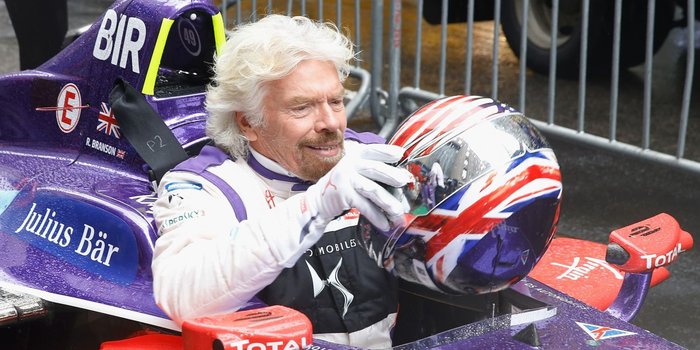
Never underestimate the power of a personal brand. The idea is simple: Use your personal identity as a branding platform separate from your corporate brand, relying on your personality and expertise to attract your own followers and build a reputation. Once in place, your personal brand can be used to support your main venture or provide a launchpad for your next one.
Creating a personal brand sounds easy, but in practice, it demands consistent ongoing attention, the right blend of tactics and of course, the right balance between your corporate and personal brand. And, as is often the case, one of the best ways to improve your own approach is to look to the approaches of others who’ve had success.
Take, for example, these five personal branding experts:
1. Richard Branson
You know Branson as the visionary founder of Virgin Group, which started as a record shop and has since expanded into areas as diverse as space travel. The company thrives on its own merits but was certainly helped by Branson’s fun, outgoing and playful personality. He’s known for putting his employees first, and frequently blogs about his perspectives and experiences. If that weren’t enough, Branson has attempted to set several world records at physical feats (sometimes risking his life in the process) and is often acknowledged for his down-to-earth mindset.
Key takeaway: Likability is a huge bonus. If people think you’re friendly and easygoing, they’ll be more likely to follow you, and potentially more likely to buy whatever it is you’re selling.
2. Neil Patel
Neil Patel is a co-founder of Quicksprout, KISSMetrics, and Neil Patel Digital. He’s also a New York Times best-selling author and someone who’s been named a top online influencer by The Wall Street Journal, Forbes and Entrepreneur, is a current or former contributor at many major online media publications (including Entrepreneur) and has a blog that generates 2 million visitors per month.
Moreover, he’s spoken at over 270 conferences and companies, has a Twitter account with over 294,000 followers and has a YouTube channel with over 3 million views. Oh, and he has a podcast, too.
Key takeaway: More isn’t necessarily better, but making your personal brand available on more channels can open you up to more possibilities than you’d otherwise find. You’ll reach a bigger audience and build brand recognition in the process.
3. Rand Fishkin
The co-founder of Moz, Fishkin has stepped away from the day-to-day operations of the company to focus on a new startup, SparkToro. Fishkin still contributes regularly to the Moz blog, and is well known as an influencer in the SEO industry. He’s also blogging for SparkToro and is active on Twitter, with more than 410,000 followers.
Key takeaway: A personal brand can be the connective tissue between one venture and the next. Think of it as an insurance policy to guard your reputation and provide a springboard to your next opportunity.
4. Elon Musk
Musk’s personal brand is the one commonality in his complex web of companies and vested interests, which includes Tesla, SpaceX, the Boring Company and PayPal (not to mention the Musk Foundation). Musk can often be found cracking jokes with people on Twitter, and is known for a host of strange personality quirks and stories about his background, including paying his way through college by hosting parties with cover charges (then eventually dropping out) and hosting famously short meetings.
Key takeaway: Be yourself. Exposing some of your strange habits and unconventional choices will serve to differentiate you from the masses, which is vital when millions of other profiles like yours are competing for attention.
5. Sheryl Sandberg
You might recognize Sandberg’s name as the COO of Facebook, but it’s her book, Lean In, which has helped her to amass a fortune, establish a powerful reputation and influence millions of professional women. This has happened through LeanIn.org, which helps women in more than 160 countries accomplish more in their personal and professional lives.
Part of Sandberg’s power is her open, public personality; she openly discussed the tragedy of her husband’s death a few years ago and partnered with a psychologist to write a new book about overcoming adversity (Option B: Facing Adversity, Building Resilience, and Finding Joy).
Key takeaway: Don’t be afraid to make yourself vulnerable and connect to people who may be sharing your experiences. Personal brands are, after all, personal.
There are really no drawbacks to starting your own personal brand, short of the hours it takes to get one rolling (and maintain it indefinitely). Accordingly, it’s in your best interest to spend a few hours establishing a personal blog and potentially some social media profiles for your personal brand.
Even two hours a week spent writing, socializing and engaging with your followers could be enough to establish the momentum you need to support your current or future business.